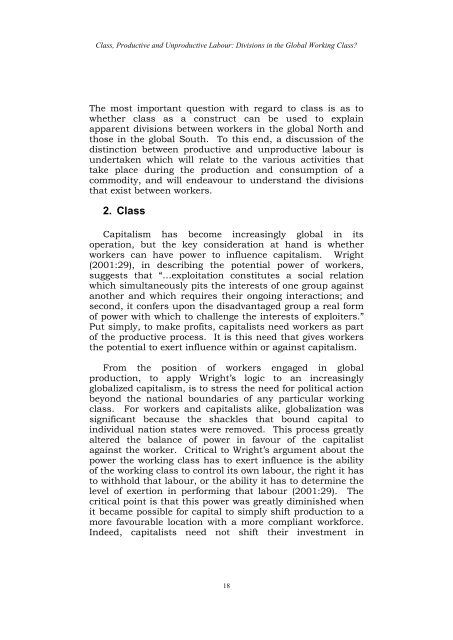Class, Productive and Unproductive Labour - Journal of Alternative ...
Class, Productive and Unproductive Labour - Journal of Alternative ...
Class, Productive and Unproductive Labour - Journal of Alternative ...
Create successful ePaper yourself
Turn your PDF publications into a flip-book with our unique Google optimized e-Paper software.
<strong>Class</strong>, <strong>Productive</strong> <strong>and</strong> <strong>Unproductive</strong> <strong>Labour</strong>: Divisions in the Global Working <strong>Class</strong>?The most important question with regard to class is as towhether class as a construct can be used to explainapparent divisions between workers in the global North <strong>and</strong>those in the global South. To this end, a discussion <strong>of</strong> thedistinction between productive <strong>and</strong> unproductive labour isundertaken which will relate to the various activities thattake place during the production <strong>and</strong> consumption <strong>of</strong> acommodity, <strong>and</strong> will endeavour to underst<strong>and</strong> the divisionsthat exist between workers.2. <strong>Class</strong>Capitalism has become increasingly global in itsoperation, but the key consideration at h<strong>and</strong> is whetherworkers can have power to influence capitalism. Wright(2001:29), in describing the potential power <strong>of</strong> workers,suggests that “…exploitation constitutes a social relationwhich simultaneously pits the interests <strong>of</strong> one group againstanother <strong>and</strong> which requires their ongoing interactions; <strong>and</strong>second, it confers upon the disadvantaged group a real form<strong>of</strong> power with which to challenge the interests <strong>of</strong> exploiters.”Put simply, to make pr<strong>of</strong>its, capitalists need workers as part<strong>of</strong> the productive process. It is this need that gives workersthe potential to exert influence within or against capitalism.From the position <strong>of</strong> workers engaged in globalproduction, to apply Wright’s logic to an increasinglyglobalized capitalism, is to stress the need for political actionbeyond the national boundaries <strong>of</strong> any particular workingclass. For workers <strong>and</strong> capitalists alike, globalization wassignificant because the shackles that bound capital toindividual nation states were removed. This process greatlyaltered the balance <strong>of</strong> power in favour <strong>of</strong> the capitalistagainst the worker. Critical to Wright’s argument about thepower the working class has to exert influence is the ability<strong>of</strong> the working class to control its own labour, the right it hasto withhold that labour, or the ability it has to determine thelevel <strong>of</strong> exertion in performing that labour (2001:29). Thecritical point is that this power was greatly diminished whenit became possible for capital to simply shift production to amore favourable location with a more compliant workforce.Indeed, capitalists need not shift their investment in18
















